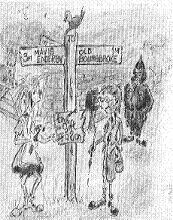I’m reminded of a scene from The Man Who Shot Liberty Valance.
It is Election Day in Shinbone and John Qualen, playing his usual comic ‘Swede’, prepares to vote by donning his best suit. Waved off by his wife and daughter he presents himself at the polling station (the saloon) where he proudly flourishes his naturalisation documents and announces that he is an American citizen.
The scene is amusing but also moving because I too find the act of casting my vote rather special. Call it a right, a privilege or a duty, I cannot understand those who do not bother to turn out to play their small part in what we can still just about call our democracy.
Even before the rise of UKIP, when I was inclined to abstain in European Parliament elections, lest I should seem to be giving legitimacy to continental imperialism, I would take my ballot and politely but firmly spoil it.
So. Today. Who will benefit from my support? Not being tribal in my party affiliation, on what basis do I decide?
My political instincts are conservative. I hate big government, the nanny state and political correctness. I believe in the freedom of the individual and the freedom of the market.
I also would like to see a much stronger Parliament and greater independence of individual MPs. I admire maverick MPs, even Labour ones like Bob Marshall-Andrews and Alice Mahon
But the fundamental policy issue for me is opposition to membership of the European Union.
There’s a UKIP candidate standing. My decision should be easy then, shouldn’t it? Well, maybe.
What about the other local candidates?
We have a fascist parson, an embittered ex-chief executive of a hospital trust, an English Democrat (the saloon bar party) as well as the UKIP man.
They are the outsiders and I will consider only UKIP, although I know nothing of the candidate himself.
Lincoln is just about a three-way marginal. Of the three leading candidates, I eliminate the Libdem as a euro-fanatic.
Gillian Merron, Labour, and MP for 13 years, is a careerist yes-woman. There’s no way I will vote for her on any grounds, personal, partisan or political.
The Tory candidate looks to be similar to Merron, a well-fed party loyalist who has made no secret of his ambition to be in government.
So it’s still UKIP, is it? There’s no way that he will be elected, but a high number of votes nationwide might have some impact on future government policy.
Who am I kidding?
In fact, strong support for any of the minor candidates will simply make it more likely that Labour or the Libdems will take Lincoln. It’s possible that Labour’s national and Merron’s local unpopularity will, allied with the Clegg-factor, let the Libdem in.
Therefore, reluctantly but realistically, I shall vote Tory - the song, not our local singer - hoping against hope that a Conservative government will decrease interference in our daily lives and stand up to the Eurocrats.





